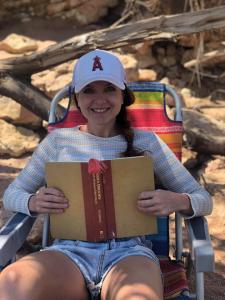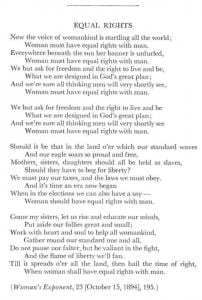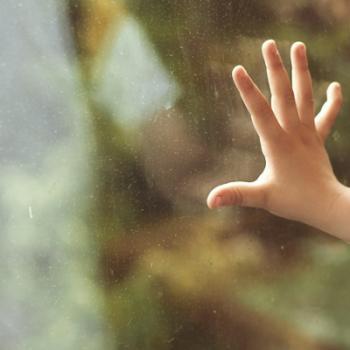When we doubt, we grieve the loss of certainty.
As a companion piece to be read alongside the LDS church’s recent articles on leaving the church, I’d like to offer my advice to Mormons who are doubting. This is based on my experience with assisting Mormons in transitional spaces for over a decade as well as my work as director of a non-profit Mormon studies organization that has had an important part to play in scholarship that sometimes disrupts a heritage-based narrative.

This is not authoritative (because things like these rarely are ), but casual advice based on my own personal experiences and observations. So, prompted by a conversation with a friend, I offer an open letter to Mormons experiencing doubt.
Dear newly-doubting Mormon,
First, just breathe.
I bet you’re feeling tension right now. Maybe you don’t feel it, and that’s okay. Maybe you’re one of the lucky ones, those who discovered a different truth than the Mormon one you were immersed in, and you instantly changed your mind, walked away and never looked back. It’s rare to meet someone able to do this, but I want to validate that some claim that path. I’d suggest if you care to read this at all though, there are probably still ties that keep you interested in Mormon things.
For those like me that feel the tension, it’s a pain drawn from the thirsty well where I used to draw my faith. It’s the tension of change. My therapist says people don’t often change until that tension becomes so overwhelming, so uncomfortable that finally you are forced to change. That’s why the change is uncomfortable. It requires growth.
Maybe we could name it together? I call my tension “uncertainty.”
It won’t be the first time you or I experience uncertainty, but it will likely be the first time you can acknowledge to yourself that your uncertainty is pointed at the institution. From my own experiences, whenever I encountered a situation that was uncomfortable and challenged me before this, I usually turned to questioning myself. This was a different kind of doubting. For the first time in my life I realized I felt uncertain about my worldview. I always say it wasn’t that I lacked faith, it’s that I had too much of it. I believed the idea that “the church was perfect, the people were not.” That is such a harmful idea, to believe any one thing could be perfect at all (not only does it erase the Mormon doctrine of Christ’s atonement, it’s just factually inaccurate.).
I think back on it now and remember it as a tidal wave of pain crashing onto the shore of my values. But the reality is, in real time I experienced it as ripples. Slight movements on a still water happened for years and the uncertainty just pulled them out of a dusty database in my brain. All those moments when I doubted myself had to be interrogated. Was something wrong with me or was something else going on?
Anyway, I don’t need to explain this to you. You know how this feels if it happens to you. Your experience is your own and I hope you claim it in the broad experience of the Mormon diaspora. There’s more than one way to Mormon.
If your experience was anything like mine, it might be hard and heavy and I think part of the reason why is, Mormonism doesn’t always equip us with the resiliency of being wrong. We fear being wrong more than we fear anything else in this world. We need to be right, to pray for a perfect knowledge, to be steadfast and immovable.
The problem with those ideas are they are antithetical to growth and they need to be examined. To doubt is to mourn the loss of certainty. To doubt is grief work, and if you experienced certainty at all in your faith, then you can expect to feel doubt accompanied by grief.
Here are some of the things I learned in my grieving that I’d love to pass on to you:
- Doubt and be still. You will feel pressure to decide what to do when you doubt. Does this mean you leave the church? What if you’re not ready? What will your family think? You will feel pressure to act. Our Mormon faith taught us to be decisive about our faith, to testify how we feel about it, to confess when we stray from it. Your community of faithful Mormons will want to know and will wonder about you. Your exMormon friends will ask how you could possibly stay. Don’t worry. Only you truly know how to best navigate this. Learn to trust yourself. Nurture the doubt until it grows into a surety and the pain dissipates. Doubt is an opportunity to learn something new.You will choose what is right for you when you are ready. When the discomfort is too heavy on one end or another, you will adjust. Don’t feel bad about either. This is your body protecting itself, taking care of you. Listen to it, but don’t feel pressure. Trust yourself. I know we are taught to doubt our doubts, but our bodies are designed to respond to them. They have kept our ancestors safe for thousands of years. Our brains are curious and questioning things is how we grow. You leave or you stay: either option only matters in how it works for your heart. People make choices when they are ready. Practice learning which values and teachings you can tolerate and which you cannot, which you can accept and which you cannot. Start drawing some boundaries on who and how your choices are made.
- If you’re like me, you will walk around as a constant apology for a while. Don’t beat yourself up about it, just pay attention to it. Every time I was around my Mormon community all my actions and thoughts said, “I’m sorry I did this. I’m sorry I changed.” I felt almost as if I was doing something wrong when I was with them. I was, I was changing.Sometimes it made me obstinate and defiant. Other times I preempted pain by being skeptical of everything. Sometimes I was unkind and assumed people were judging me (most of the time I was right). We grow up practicing group discernment with cultural and social signalling to alert us if someone steps out of the mold. But it’s less about them feeling “the Spirit” and more about them sensing your growth. Growth is hard to hide. Practice being comfortable with people seeing you change. Try to be patient and kind with their discomfort (because it could be a great gift for them as well) but don’t take responsibility for it. They, like you, feel the weight of the cultural stories. They, maybe even more than you, believe the stories about “apostates.” Their concern is often misplaced love and an inability to articulate their own emotional needs.
- Practice being firm and kind. A change in your faith is one of the best times to begin to learn and practice boundaries. (P.S. I’m still working on this.) Mormonism, especially within the heart of Utah, is an enmeshed culture that teaches one another to rely on each other, and so our boundaries of trust are sometimes unhelpfully skewed.I often think about how many times we left little children with two random adults from the ward and never thought for a second something bad would happen. I trusted people just because they were mine. I was lucky. So many aren’t so lucky. Be patient with yourself here. These are the things, at least for me, that have taken the most time. I’ve had to learn the hard way about what some of my boundaries are. Those experiences are important gifts to me, although they didn’t feel so at the time. You will have to practice being more bold and honest.Mormons are more afraid than being direct than anything. This is why Passive-Aggression is our mother tongue. Learn to speak a different language. One that asks kindly and firmly for what your needs are. Your assertiveness will sometimes feel harsh to them, so try and soften the edges where needed, but it is a kindness to them in the end. It is a kindness to the world when we are clear on our needs and communicate them. Unmet needs will be met in sideways directions, so pay attention and be honest about what you need and move towards it with as much kindness as you can muster.
- You’re going to screw up. My favorite lyrics from a Fiona Apple song say, “I’m going to make a mistake, going to do it on purpose / I’m gonna do another detour, Unpave my path.”Some paths will need to be unpaved. As your doubts lead to more exploration, you may realize that a lot of scaffolding inside you needs to be dismantled.You were fed some pretty harmful myths about gender, race, prosperity, and more. You won’t be able to change those overnight. In fact, you can’t just “choose” to not believe in sexism or racism anymore. You can work to become anti-racist or anti-sexist, but we were baptized in these waters. I always say Mormonism is “full immersion.” None of us who believed or interacted with Mormonism escapes these. It’s a church that values a white American patriarchal order. It is “deeply-dyed,” as Brigham Young would say. So try and resist those things. Recognize them. Acknowledge them.Have honest conversations with yourselves about how these harmful scripts still show up for you. If you work on it, over time they will become easier but don’t make the mistake of thinking you’ve rooted them up completely. They will show up for you in odd ways and at odd times if you aren’t careful. You can be careful by naming them and getting really honest with yourself. These conversations are painful and hard. You will get defensive.Let defensiveness be your lode star. It will point you to the parts of yourself that are unexamined. This is also true courage because it shows you that you love yourself enough so radically that you allow yourself to make mistakes. You don’t know everything. How could you? You will inevitably make mistakes as you process through this. Try not to let your mistakes harm others (although this is virtually impossible, but you must try). Learn to love your imperfect self and as you do this, you will learn to love others in their mess. You will shed the shame of sin and gain the blessing of empathy. Your growth isn’t a sin so long as it makes you kinder and more compassionate.
- This one is mostly for people living in highly-density Mormon areas: Get comfortable with disappointing the neighbors. Your learning and growing, especially as you practice your boundaries, is going to look like a disaster from the outside in. We all know how we judged people who didn’t look and act like we did. Now is your time to test those myths on what “good, stable, safe people” look like. As you start to maybe dress differently, or act differently, people will judge you. You can’t make yourself okay with the judgment of others unless you are rooted in a disagreement with them. If you judge women in tank tops, you’ll be afraid to wear one. Wear one anyway, just once, and interrogate how you feel. We do our neighbors a favor when we offer diversity to them. Diversity is just “truth out loud.” As Mormons, we practice homogeneity so much we think it’s a value. Interrogate that by being different.
- Be angry. Maya Angelou says anger burns out the bitterness. Don’t run from your emotions. Many people that leave the church move immediately into “positivity culture,” the idea that you can think your success into being, that if you are optimistic or just look for the good, you can be successful. This is a remnant of prosperity culture and doctrine. The reality is that the world is a harsh place sometimes for fragile, organic beings. We are all going to struggle sometimes.Struggle is natural, growth is natural. Don’t be afraid to practice being honest about your feelings and giving them space. You will feel pressure to appear as if everything is fine. That’s the prosperity myth still chasing you. I sometimes say, “When you stay in the church and have a struggle, it’s a just trial. But when you leave the church and you have a struggle, it’s a punishment.” The one thing that doesn’t change is the struggle.
You can even help your Mormon family and friends by not hiding your struggles. You’ll find that your openness and vulnerability will bring others to you who feel lonely in their own struggles. Be the one to break the barrier of silence, but be rooted in your boundaries first. Mormons have what my friend Ryan Flake calls, “promiscuous disclosure.” So many of us still have the need to confess our “sins” to someone. (It’s essentially what I’ve been doing on my podcast for the last five years.) Practice being vulnerable with people who are safe, and honest with those who deserve it, but do not be afraid of struggling. You will struggle, and so will everyone else. You just get to finally escape the idea that your worthiness brought it on.
- Practice meeting people right where they are. No one is born better than someone else. Start practicing taking out the middle initial when referring to church leaders (as Carol Lynn Pearson teaches).I often think of one of my heroes, Mayor Donia Jessop, the first woman to be elected mayor in the town of Hilldale, UT, a town that was deeply and historically patriarchal. When she was elected, seven men resigned from the city council. Donia says that, as mayor, she has had many times where she has had to meet men head-on who used to be in patriarchal authority over her. She talks about how nervous she used to get speaking to them, but then she remembered she was in charge. She is the mayor and they are just constituents. She says she has practiced seeing them simply for what they are: people, like everyone else.This is such great advice.
When you talk to old church leaders, you’ll likely fall back into old patterns. When you doubt, you’ll even feel the need to confess to your bishop or stake president. If that is something you need to do, then do it, but be rooted in the fact that you are confessing deeply important and sometimes personal things to men who are just people, like everyone else. Here’s my advice on that front: tell if you need to, but practice not confessing things that aren’t sins. And please hear this: doubt is not a sin. If you don’t practice resisting these social scripts, they probably will never change for you. Try to be aware of them. Realize that the way you interact with authority is likely shaped by your Mormon experience.
- And finally, be gentle with yourself. That’s it. That’s how we end this advice: Be gentle. And while you figure out your own values and boundaries, you can borrow some of mine to take along with you: curiosity, empathy, kindness, accountability, boundaries. They haven’t failed me yet.
With love and as a fellow traveler on this fragile earth,
LHP











